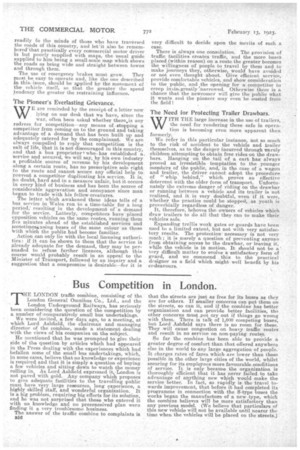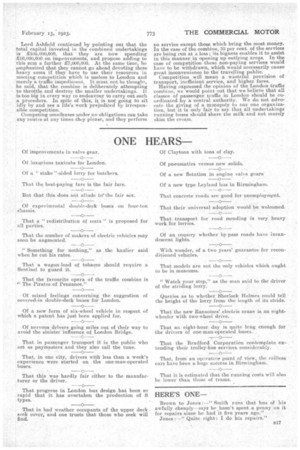Bus Competition in London.
Page 2

Page 3

If you've noticed an error in this article please click here to report it so we can fix it.
HE LONDON traffic combine, consisting of the London General Omnibus Co., Ltd., and the Loudon Underground Railways, has seriously been considering the question of the competition by a number of;comparatively small bus undertakings. We were invited, a few days ago, to a meeting, at which Lord Ashfield, the chairman and managing director of the combine, made a statement dealing with the views of his companies on the subject.
Ile mentioned that he was prompted to give their side of the question by articles which had appeared in the Press dealing with the experiences which had befallen some of the small b-us undertakings, which, in some cases, believe that no knowledge or experience is required and that it is simply a question of buying a few vehicles and sitting down to watch the money rolling in. As Lord Ashfield expressed it,-London not paved with gold. Any company which proposes to give adequate facilities to the travelling public must have very, large resources, long experience, a highly skillea itaff, and wonderful organization. It is a big problem, requiring big efforts for its solution, and he was not surprised that those who entered it with no knowledge and no preconceived plan were finding it a very troublesome business.
The ansvier of the traffic combine to complaints is B16 that the streets are just as free for its buses as they are for others. If smaller concerns can put them on the streets, so can it, and if the combine has better organization and can provide better facilities, the other concerns must pot cry out if things go wrong with them. There is talk of 1,000 competing buses; but Lord Ashfield says there is no room for these. They will cause congestion on heavy traffic routes and result in no service on non-paying routes.
So far the combine has been able to provide a greater degree of comfort than that offered anywhere else in the world to any large aggregation of people. It charges rates of fares which are lower than those Possible in the other large cities of the world, whilst securing for its employees more favourable conditions of service. It is only because the organization is thoroughly efficient that it has never failed to take advantage of anything new which would make the service better. In fact, so rapidly, is the travel towards improvement, that before it had completed its programme in connection with the S-type buses the works began the manufacture of a new type, which the combine believes will be more satisfactory than any previous model. (We believe that particulars of this new vehicle will not be available until nearer the time when the vehicles will be placed on the streets.) Lord Ashfield continued by .pointing out that the total capital invested in the combined undertakings is E106,000,000, that they are now spending 7.0,000,(X)0 on improvements, and propose adding to this sum a further 21,000,000. At the same time, he .emphasized that they cannot go. ahead devoting these heavy sums if they have to use their resources in meeting competition which is useless to London and merely a traffic impediment. It must not be thought, he said, that the eombine is deliberately attempting to throttle and destroy the smaller undertakings. It is too big in every way to endeaVour to carry out such a procedure. In spite of this, it is not going to sit idly by and see a life's work prejudiced by irresponsible competition.
Competing omnibuses under no obligations can take any routes at any times they please, and they perform no service except those which bring the most money. In the ease of the combine, 33 per cent. of the services are being inn at a loss ; its bigness enables it to assist in ads manner in opening up outlying arep. In the case of competition these non-paying services would have to be withdrawn, which would necessarily cause great inconvenience, to the travelling public. Competition will mean a wasteful provision of transport, inefficient service, and higher fares.
Raving expressed the opinion of the London traffic combine, we would point out that we believe that all classes of passenger traffic in London should be co.-. ordinated by a central authority, We do not advo-. cate the giving of a monopoly to any one organiza-. tion, -but it is only fair to say that all undertakings running buses should share tht milk-and not merely skim the cream.
































